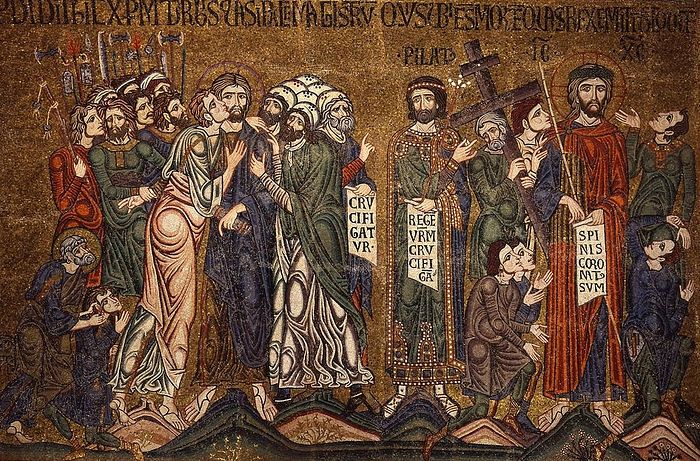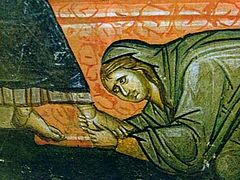In the name of the Father, the Son, and the Holy Spirit
Today, when we in thought, feeling and spirit are carried to the week of Christ’s Passion—the Passion began not with the scourging and crucifixion, but through this entire week, filled with the extraordinary suffering of the God-man. And on this day, called in the Church Great Wednesday, we remember how a crime was committed that is the most horrible, the most shocking in human history—how a disciple betrayed his master. This was a man who had been granted to see and experience everything that Christ granted to His closest friends, His twelve disciples. And now, 2000 years later, people remember this betrayal—the Church in its services, hymns, and stichera contemplates this and is astounded, even now. How could it have happened? And neither can we fully understand this terrible apostasy or this man’s motives.
It is no accident that Judas is called in one of the verses, “servant of God” and flatterer, disciple and disparager, friend and devil. He possessed both of these aspects. How was he different from the others? After all, all the disciples betrayed Christ. Just take Peter, for example. He also denied Christ. He also said such terrible words as, “I know Him not.” But what an enormous difference in their fates, and in their significance for the whole Church. Both Judas and Peter repented—it says quite clearly in the Gospels that he “repented himself” (Mt. 27:3). But we recall what happened after this repentance. He repented, then went and hanged himself. The apostle Peter wept bitterly over his sin of apostasy. The Savior forgave him, and he became the man that we now have—a great chief among the apostles. All his great dignity and worth as an apostle and teacher were returned to him by the Savior. So what happened here? What is the difference? First of all, it is in their relationships to Jesus Christ.
Both of them walked with Christ in Galilee and Judea, they saw the sick being healed and the dead raised back to life. They heard the amazing words their Teacher addressed to them and to the people. However, Peter saw in Him the merciful, infinitely compassionate God, Who forgives every repentant sinner all his sins, that He receives him as a son—fallen, sinful, but still a son. But for Judas the image of God, the God-man, his Teacher Jesus Christ was completely different. If Peter and the other apostles perceived Jesus Christ as He is, as He revealed Himself to them, then Judas created this image in his own likeness. He created a god in his own image and likeness—the image and likeness of fallen man, and he didn’t believe that such a terrible sin as betrayal—and this sin was fully revealed to Judas as such after Jesus Christ’s crucifixion—that this god whom he had created in his own soul, a god that had nothing in common with the real God incarnate, Jesus Christ, could ever forgive such a sin. And so he fell into despair, and went and killed himself. This is because in his soul was not God, but a terrible idol created in his own image and likeness.
How can we ourselves avoid doing the same, accepting not God but an idol of our own making? This is the task of every Christian. We see in ourselves both friend and devil, disciple, and disparager. Let’s look into our souls and see that every time we sin we are committing a betrayal. And there can be no other explanation for our sin, when we consciously break the commandments of God. We make ourselves similar to the betrayer.
How does this terrible despair in relation to God get formed? How does this unbelief in His all-good Providence, His infinite mercy and love for man get formed even in the souls of the closest disciples of Christ, even miracle-workers? After all, Judas worked miracles along with the disciples; he was given extraordinary apostolic gifts. Tangibly in this great and terrible Passion Week, God’s great plan was already in action. In the Gospel of Matthew the Lord says to His disciples, in two days shall be the Passover, and the Son of Man shall be betrayed to crucifixion. The disciples came to their Teacher’s triumph, His entrance into Jerusalem as King, but this maelstrom of events is already beginning. God has come to save mankind, but the devil is already at work in his servants. Then assembled together the chief priests, and the scribes, and the elders of the people, unto the palace of the high priest, who was called Caiaphas, and consulted that they might take Jesus by subtilty, and kill him (Mt. 26:3-4). This was also allowed by God in the course of man’s salvation, when the Son of Man had to be slain for the salvation of the world.
Judas makes the decision to betray Christ. We recall when this took place. This is a very important point in our understanding of just who Judas was, why he became what he was. And what is our part in this sin? If we see it, perhaps we can resist it. Then one of the twelve, called Judas Iscariot, went unto the chief priests, and said unto them, What will ye give me, and I will deliver him unto you? And they covenanted with him for thirty pieces of silver. And from that time he sought opportunity to betray him (Mt. 26:14). When did this happen? At the moment, as we hear in the canon, when a woman, a harlot comes with an alabaster box and pours myrrh over Christ’s head. But when his disciples (and this means Judas) saw it, there is a protest in favor of fairness itself: why such extravagance? To what purpose is this waste? For this ointment might have been sold for much, and given to the poor (Mt. 26:9). The worst, most serious spiritual sins are committed under the noblest pretexts, as assertions of rightness and justice, but justice according to human understanding. At this the Savior says to him, Why trouble ye the woman? for she hath wrought a good work upon me. For ye have the poor always with you; but me ye have not always. For in that she hath poured this ointment on my body, she did it for my burial. Verily I say unto you, Wheresoever this gospel shall be preached in the whole world, there shall also this, that this woman hath done, be told for a memorial of her (Mt. 26:10-13). Love, endless love moved this woman. And even if she had done something that is arguably wrong from the worldly point of view, that means nothing. The Lord accepts the intention—the Lord kisses the intention, as it reads in the Slavonic; and her intention was beautiful and holy, and the Savior approved of it.
But Judas was indignant. And this indignation was so strong, this thirst for rightness and justice, a justice that we would call today social justice, was so strong and unbearable that the hatred for his Teacher, Jesus Christ that he had been nurturing for a long time surpassed all bounds. In the Gospel according to Luke yet another important detail is added: The devil entered into Judas’s heart—Then entered Satan into Judas—and he went and did that terrible deed. What will ye give me, and I will deliver him unto you? (Mt. 26:15)
This morning (Great Tuesday) we heard something in the Gospel reading that is very similar. We read the Gospel parable about the talents, how a householder gave out talents to his workers, to one five, to another ten, to another just one—large sums of money that the householder had earned himself; and said, multiply them, work with me, do something remarkable and beautiful. Each of them increased the talents except for one. This one returned the one talent he received and said, Lord, I knew thee that thou art an hard man, reaping where thou hast not sown, and gathering where thou hast not strawed: and I was afraid, and went and hid thy talent in the earth: lo, there thou hast that is thine. His lord answered and said unto him, Thou wicked and slothful servant, thou knewest that I reap where I sowed not, and gather where I have not strawed: thou oughtest therefore to have put my money to the exchangers, and then at my coming I should have received mine own with usury. Take therefore the talent from him, and give it unto him which hath ten talents. For unto every one that hath shall be given, and he shall have abundance: but from him that hath not shall be taken away even that which he hath. And cast ye the unprofitable servant into outer darkness: there shall be weeping and gnashing of teeth (Mt. 25:24-30). He who has ears to hear, let him hear, says the Lord.
What are the words that servant said? I knew that you are a hard man. You reap where you haven’t sown, and gather where you haven’t strawed. Doesn’t this remind us of what all the revolutionaries of all times and nations have said? How that fire burns in them, how their indignant minds boil, and they are ready to go and fight to the death. For justice; but just look at what a lie that is—he received what was not his, what he had not created, he received a talent no matter how he might object, material, creative, a talent in the sense that we now say.
If that person could not multiply the talent, or if out of laziness just didn’t want to, out of hatred for the one who gave it to him he came to hate his teacher, to so great an extent that that hatred becomes irrational—he doesn’t understand why he hates him. He doesn’t understand why he backbites him all the time, and he simply lives in this state of negative energy that comes from his backbiting. One would think—that master gave him all that the man could handle, one talent was all he could handle, and yet he receives in return nothing but hatred. And the master says to him, “You knew that I reap where I have not sown and gather where I have not strawed, although in fact that is not so. But let’s say that I am a hard man. You see me as cruel—so shouldn’t you at least out of fear do what I asked? If not out of inspiration, or love for your work or for your master, at least out of fear. You have nothing but that terrible, impervious hatred, which will sooner or later destroy you. What was the main goal of that servant with the one talent? He hated his master so much that he would do anything just not to see him; his entire being was imbued with this hatred. And so the master fulfills his wish—he takes the one talent away from him and gives it to the man with ten, then has him cast into outer darkness where he will not see his master. The same thing happened with Judas. The Lord took away his talent of apostleship and gave it to another apostle; and to whom? To Mathias. There will be weeping and gnashing of teeth. Weeping from offended feelings and anger against God, and gnashing of teeth of despair because everything went against his will. The very same thing happened with wretched Judas—terrible, irrational hatred. Do you remember how he went to the high priests and threw the thirty pieces of silver at them, saying that it was the price of blood? "I have sinned in that I have spilled innocent blood," he says. A friend and a devil, a disciple and a disparager, finally and irrevocably caught up in his love-hate, when hatred takes the fore.
This is how careful we must be in the matter of the spiritual life. That is why we have to reveal our most hidden, onerous thoughts, which so often bring one to such a disastrous shipwreck as they did to one of the great apostles.
This is a shocking crime. No matter how much it’s been discussed we nevertheless cannot completely fathom it. May God grant that no matter what our circumstances, no matter how badly we sin, we might always like the apostle Peter remember the one truth given to us by our only true teacher, our Lord Jesus Christ. May we remember that we can always return from our unrighteousness to Him, and that the Lord will always forgive us no matter what we did, if only in our heart would live not hatred but love for Him; not despair but sincere repentance. Amen.




